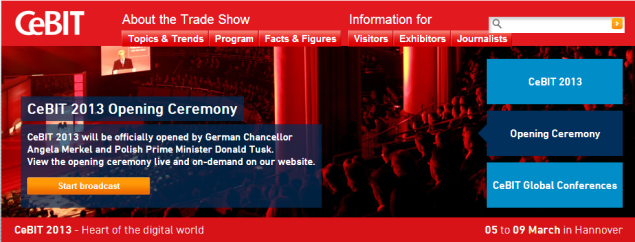- Home
- Laptops
- Laptops News
- CeBIT ready to kick off, but have CES, MWC stolen the show?
CeBIT ready to kick off, but have CES, MWC stolen the show?

More than 4,000 exhibitors from some 70 countries are expected to set up shop in the northern German city of Hanover, about the same number as last year despite the weak economic environment, organisers said.
"CeBIT is becoming increasingly international as we see countries in Asia and Africa developing more and more into IT nations," said Hartwig von Sass, a spokesman for organisers Deutsche Messe.
However, even with stable exhibitor numbers, the CeBIT is a far cry from its glory days at the height of the dot-com boom, when 8,000 firms would scrap for places in the hanger-like halls of the sprawling fair grounds.
CeBIT is battling competition from the swanky Consumer Electronics Show in Las Vegas and the just-finished Mobile World Congress in Barcelona but Sass insisted that Hanover was still top of the tree.
"No matter what other fair you look at, they're all half as big as us," said Sass, who said 350,000 visitors swarmed through the stands last year.
CeBIT is also the only fair catering to the whole IT sector rather than a specific part, he added, announcing that tech giants like IBM, Microsoft, SAP and Google would be present at this year's event.
The IT industry enters the CeBIT in relatively bullish mood, with German industry group BITKOM forecasting in the run-up to the fair that global tech spending was poised to rise by 5.1 percent to 2.7 trillion euros ($3.5 trillion) this year.
This year's CeBIT theme is "shareconomy", the increasing trend of users sharing data and things, with examples being "carsharing" and of course social media sites like Facebook, Twitter and Instagram.
Several exhibits will be devoted to shifting the way office communications are run, moving from email which some experts see as increasingly obsolete to internal social media platforms.
Innovative ways to process vast amounts of data as well as the perennial issues of cloud computingstoring data remotely and Internet security will also be major topics at this year's event.
But as ever with the CeBIT, it is not all work and no play as there will be the usual display of head-spinning gadgets and pointless but fun applications to entertain the punters.
For those who despair of finding the right items in massive supermarkets, a firm has developed a trolley that communicates with the shelves, points the hapless shopper in the right direction and ticks things off the list.
And for the strains of daily life, a communications firm has created an app that gives you a read-out on your stress levels just from testing your voice.
Another firm has pioneered the must-have piece of furniture for those accused of being couch potatoes.
The chair measures weight, heart rate, blood pressure and other important health data and, if it doesn't like what it sees, transforms into a rowing machine so you can shift a few pounds while you watch your favourite programme.
While the fair officially throws open its doors on Tuesday, German Chancellor Angela Merkel will give the opening speech the night before along with Polish Prime Minister Donald Tusk.
Poland is this year's "partner country", with around 150 Polish exhibitors expected to make the trip over the border.
Get your daily dose of tech news, reviews, and insights, in under 80 characters on Gadgets 360 Turbo. Connect with fellow tech lovers on our Forum. Follow us on X, Facebook, WhatsApp, Threads and Google News for instant updates. Catch all the action on our YouTube channel.
Related Stories
- Samsung Galaxy Unpacked 2026
- iPhone 17 Pro Max
- ChatGPT
- iOS 26
- Laptop Under 50000
- Smartwatch Under 10000
- Apple Vision Pro
- Oneplus 12
- OnePlus Nord CE 3 Lite 5G
- iPhone 13
- Xiaomi 14 Pro
- Oppo Find N3
- Tecno Spark Go (2023)
- Realme V30
- Best Phones Under 25000
- Samsung Galaxy S24 Series
- Cryptocurrency
- iQoo 12
- Samsung Galaxy S24 Ultra
- Giottus
- Samsung Galaxy Z Flip 5
- Apple 'Scary Fast'
- Housefull 5
- GoPro Hero 12 Black Review
- Invincible Season 2
- JioGlass
- HD Ready TV
- Latest Mobile Phones
- Compare Phones
- Tecno Pova Curve 2 5G
- Lava Yuva Star 3
- Honor X6d
- OPPO K14x 5G
- Samsung Galaxy F70e 5G
- iQOO 15 Ultra
- OPPO A6v 5G
- OPPO A6i+ 5G
- Asus Vivobook 16 (M1605NAQ)
- Asus Vivobook 15 (2026)
- Brave Ark 2-in-1
- Black Shark Gaming Tablet
- boAt Chrome Iris
- HMD Watch P1
- Haier H5E Series
- Acerpure Nitro Z Series 100-inch QLED TV
- Asus ROG Ally
- Nintendo Switch Lite
- Haier 1.6 Ton 5 Star Inverter Split AC (HSU19G-MZAID5BN-INV)
- Haier 1.6 Ton 5 Star Inverter Split AC (HSU19G-MZAIM5BN-INV)







![[Partner Content] OPPO Reno15 Series: AI Portrait Camera, Popout and First Compact Reno](https://www.gadgets360.com/static/mobile/images/spacer.png)









